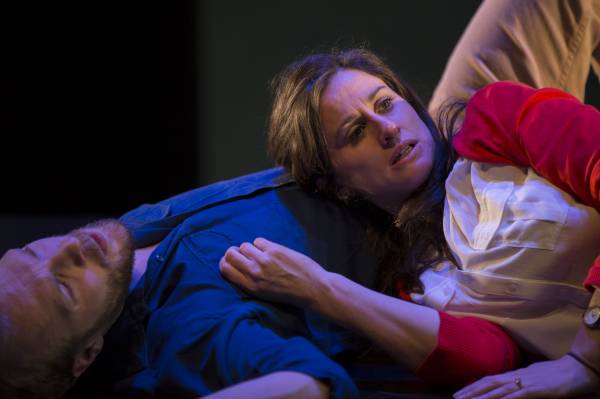Eternity Playhouse, August 12

Improvising musicians do it routinely: take a short motif and investigate all its possible convolutions, like looking at a gemstone from all angles. Playwright Nick Payne applies this device to his dazzling writing of Constellations.
The one-act two-hander explores the relationship between Marianne (Emma Palmer) and Roland (Sam O’Sullivan) from their awkward first meeting at a barbecue. Slabs of dialogue are played again and again, perhaps with a change of emphasis, a changed word, or with the roles reversed.
Although the technique has Joycean ancestry and precursors (Beckett, Pinter) in the theatre, Payne’s approach is still a little revolution. Without needing soliloquies we enter the minds of Marianne and Roland via these fantasias of possible versions of a given episode. One may be real, and the others played out in either character’s imagination.
Linear time becomes irrelevant, as in physics. Marianne is a physicist and Roland a bee-keeper. We learn a tiny (if painful!) amount about bees and rather more about physics, yet Payne always disseminates raw information so it is entirely in the service of illuminating his characters.
The actors face mighty challenges, from learning non-linear text (with repetitions and variations) to having to flit from an episode of utter desolation to high comedy like a switch being flicked. Greater virtuosity is demanded of Palmer, whose character comes to suffer expressive aphasia, a brain-damage condition affecting communication. Her performance is heart-breaking and exhilarating by turns, and a wondrous creation.
Initially it seemed Roland was a lesser invention, but it is just that he thinks and feels within a narrower band-width than Marianne. O’Sullivan delivers a nuanced, warm performance that gradually reveals more and more.
Director Anthony Skuse (for Darlinghurst Theatre Company) often has them interacting while semi-prone on a shallow riser fronting Gez Xavier Mansfield’s set, and you feel a deep truth in the way their bodies enfold. In fact Skuse uses the three-dimensional manipulation of his actors as another set of variations on a given textual theme. It is deftly done: neither busy nor self-conscious.
All design elements, including Marty Jamieson’s almost subliminal score, are muted, the dialogue and performances doing the work of creating the characters’ world. The wonder is that such an intensely intellectual play should move you so much that you sometimes forget to breathe.
Until September 7.